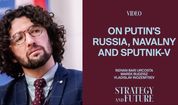The Essence of Alliances

Warsaw (source: pixabay.com)
In order to win, the Americans will have to demonstrate that despite Washington’s vast distance from Eurasia, US interests in the supercontinent are so important that US is ready to incur the same costs as the Russians or the Chinese.
This was certainly the case during the Cold War, when the American attitude convinced West Germany and other allies in the western part of the continent that the US would defend Western Europe even at the cost of a nuclear attack on Washington. Will the American attitude be the same in the 21st century in the new strategic situation in Eurasia, which would allow Poland or Taiwan to be reassured? So far, there has not been sufficient strategic argument in this particular aspect in any official speech by US officials. Such an argument was certainly not made in the speech of Donald Trump in the summer of 2017 in Warsaw, despite warm words about the Three Seas Initiative, criticism of the continental European bureaucracy and many beautiful sentences about the values and heroic past of Poles.
Indeed, many US officials quite often comment on US leadership in Europe. In particular, the repeated argument that America is to stay with Europe to support its allies is unconvincing. For geostrategic alliances are not about favors but about interests. American alliances are also there to serve the interests of the USA, that is, to maintain the advantageous position of the USA in Europe and Asia. This is the concrete glue of the alliance. If America doesn’t need to maintain its position in Eurasia, or is no longer able to do so, commitments and the American presence will disappear anyway.
There is one fundamental difference between Asia and Europe. In Asia, after America’s possible withdrawal, Australia, allied with the US, will be forced to cooperate with China in one way or another – because China is an economic power. It is different in Europe: Russia is an economic weakness, so the states on the Intermarium can boldly manage without economic cooperation with Russia.
Moreover, alliances are never eternal, however much many people think. Especially when the alliances are believed to be based on ties between history and culture and on shared values, rather than on geostrategic interests in development, security and power building. The above false image of alliances, based on identity, gives rise to many negative consequences and perceptual errors, including in the status game in the alliance between its parties, creating the erroneous impression that someone is doing someone a favor in this alliance. People in Poland used to think that too often. International relations don’t work that way. Real alliances require real commitments and costs, and only such alliances matter. All sentiments evaporate like morning fog if there are no common interests and goals. So when America starts to leave Europe, it will not share its interests with its allies.
This has been the case many times in the history of the world. For example, when Britain withdrew strategically from Asia and the Indian Ocean in the early 1970s despite close historical and linguistic ties, and undeniably shared values with Australia. The then Anglo-Australian alliance evaporated in “one night”. Great speeches will save nothing as long as the alliance does not have a practical purpose, resources and common interests pursued by this alliance. “The Polish nation is an exceptionally patriotic nation. Anyone who knows how to move the strings of our patriotism can play any melodies,” wrote Stanisław Cat-Mackiewicz about the lack of understanding of the essence of alliances.
Hugh White described in his autumn 2017 essay (Without America. Australia in the New Asia) what would happen if Trump suddenly called the Australian Prime Minister and announced that a war had broken out in the South China Sea, asking for allied solidarity. White believed that Prime Minister Turnbull probably would have no choice but to say “yes” because such is the software of politics and it is no different in Australia.
In this context, it is puzzling how Poland would behave. Not only in the face of the outbreak of the war in the Western Pacific (this also), but especially in the event of a war in the Baltic states – how would Poland act, especially in a specific military and strategic situation, when saying “no” could destroy the credibility of the North Atlantic Alliance and the independence of the Baltic states although it would not destroy Poland. Hugh White proves using the Australian example that it is imprudent to enter a war “with a blank promissory note” without fully understanding what the specific end (not emotional) goals of the war are, what will happen as a result, and what are the risks and costs of war for the state. We do not like to think in these terms, because we have convinced ourselves, and then reaffirmed that Poland cannot survive without Western allies.
The essence of power is to achieve your goals at a cost lower than that of another state that would try to oppose the agency of the former.
Superpowers do not immediately exercise their power directly and ostentatiously on smaller countries. This is not so easy at all. For even weak countries can largely control what happens on their territory. Powers can change this if they send troops or apply economic sanctions to the weaker country. Instead of applying harsh economic sanctions at once to ensure the desired behavior, powers first offer rewards or impose costs: for example, arms purchases or unequal trade deals. Indeed, the main measure of a country’s international strength is its ability to impose costs on other countries at a low cost to itself. Hence, in the absence of a constructivist order, there is a search for “levers”, eternal competition and, as a result, a zero-sum game between states. This implies that even weaker nations always have room for maneuver, unless they are occupied, provided that they are ready to pay the price of freedom of maneuver.
Without the credibility and strength of the United States and NATO, Polish politics would necessarily consist in maintaining maximum independence for the minimum possible cost in the constant tension of balancing everywhere and in all directions. In this change in the balance of power in our part of Europe, we must become a security exporter. Fortunately, Russia is economically weak, so it cannot use economic pressure on Poland. Also, it is unlikely to be able to apply energy pressure if Poland becomes independent from its energy. That is why energy independence is so important because it does not increase the costs of the independence policy. Managing this pressure in the future in the supercontinent of Eurasia will require cold heads and calmer nerves.
A well-prepared military force can prevent a foreign power from imposing its will by increasing its costs and increasing the risk of a possible attack. Medium-sized countries will have to deal with this in Eurasia with their own A2AD anti-access systems.
Countries that are lucky to experience a golden period of strategic pause do not really need foreign policy at a high level of complexity, because the world system “works” for them automatically – as it did after 1991, and certainly as it did after 1999, when Poland joined NATO and in 2004, when it joined the European Union. Otherwise, countries have to make choices, difficult decisions and sacrifices every day to shape the world around them so that they remain safe or become safe and prosperous. It is also a test of the ability to prove to be a core area capable of independent living without looking for another core area for protection. Even remaining in an alliance with the US, Germany or the European Union, it makes sense to strive to consolidate and develop one’s own core area, because any constellations with Germany, the European Union or the United States may not turn out to be particularly resilient in the end – unlike Poland.
Autor
Jacek Bartosiak
CEO and Founder of Strategy&Future, author of bestselling books.






Trwa ładowanie...